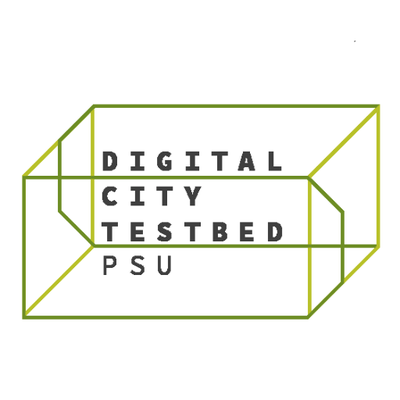Cascadia Innovation Corridor
| Cascadia Innovation Corridor | |
|---|---|

| |
 Digital City Testbed Center | |
| Team Organizations | Portland State University University of British Columbia University of Washington Cisco Systems Microsoft ESRI |
| Team Leaders | Jonathan Fink |
| Participating Municipalities | City of Portland Oregon USA |
| Status | Launched |
| Document | None |
Description
Municipal, academic, corporate and federal smart city activities are being coordinated across Portland, Seattle and Vancouver BC through the integration of several regional initiatives:
- Digital City Testbed Center (DCTC), based at Portland State University (PSU), is using academic, corporate and nonprofit campuses throughout the region as test sites for evaluating smart city innovation. “Digital Corridors” are being set up on each campus.
- Cascadia Urban Analytics Cooperative (CUAC) is leveraging corporate funding and faculty expertise at UBC, University of Washington and PSU to address data-intensive, policy-relevant social science issues like opioid dependence, housing affordability and transportation access
- Cascadia Innovation Corridor (CIC) convenes annual summits of business, government and academic leaders to set a rigorous regional economic development agenda, and also has subcommittees that meet quarterly to advance specific topics. Lead organizations are Challenge Seattle, the British Columbia Business Council and the Canadian Consulate in Seattle.
Challenges
- Vision Zero (monitoring near-collisions of pedestrians and bicyclists with vehicles using Numina’s video capture system)
- Visually-impaired people need better navigation tools for getting around cities. We’re deploying “smart paint” and audio-based tech solutions from Aira and other vendors.
- People who use wheelchairs can’t negotiate steep slopes. We’re deploying AccessMap (from UW) to help this population finds less-steep routes to get across campus and town.
- Indoor room occupancy needed in order to calculate exposure time to disease in campus classrooms.
- Indoor and outdoor air quality sensors need to be coordinated, calibrated and tested.
Solutions
Major Requirements
- Pilot technologies on a single campus such as the “Digital Corridor” on the PSU campus.
- Test, refine and measure the performance of this campus and share results with other campuses
- Deploy on at least one other campus integrating with technologies developed on this campus and again test, refine and measure performance in this new context
- Produce a plan for future deployments detailing costs, challenges, opportunities and benefits so other campuses and municipalities have good data and a roadmap for deployment.
Performance Targets
| Key Performance Indicators (KPIs) | Measurement Methods |
|---|---|
|
The Cascadia Innovation Corridor will deploy cyber physical devices on fixed infrastructure, on mobile infrastructure and in devices to gather information that will help improve access, well-being and vibrancy of our cities and communities. |
Standards, Replicability, Scalability, and Sustainability
Our goal is to provide information that can be used in establishing policies and standards, methodologies to help with replicability and sustainability and data that supports sustainability efforts.
Cybersecurity and Privacy
The corridor is working with PSU, Microsoft, ESRI, Cloudera and Clairvoyant on the Portland Urban Data Lake where the data from City of Portland and DCTC campus testbeds will be stored and analyzed. We are working with Tozny and DHS on approaches to securing both privacy and security of this and other kinds of personal data.
Impacts
The Cascadia Innovation Corridor will test and deploy technologies that improve access, well-being and vibrancy of our cities and communities throughout the Pacific Northwest and provide data and roadmaps to support other communities to do the same around the world.
Demonstration/Deployment
We’re aiming to have our first “Digital Corridor” launched on the PSU campus in time for the Smart City Tech Jam in Portland in September.
- PSU committed $1.5M to DCTC in 2018. PSU and City of Portland are jointly deploying several co-located smart city applications on the PSU campus beginning this summer. Network of campus testbeds launched with PSU, OMSI and UBC campuses as inaugural test sites.
- Microsoft invested $1M in CUAC in 2016. UBC contributed $200K in 2018. UBC and UW each planning to invest $75K in 2019 in seed grants. Renewal proposal to be submitted to Microsoft this summer.
- CIC convening fourth annual summit in Seattle in October 2019.
- Oregon Museum of Science and Industry (OMSI) recently launched a 10-year, mixed use, economic development project for their 18-acre site, which will incorporate smart technology in building operations, energy use and transportation systems. Development being coordinated with City of Portland.
- Portland, PSU, Microsoft, ESRI, Cloudera and Clairvoyant launched the Portland Urban Data Lake (PUDL) in April 2019 to host data from City of Portland and DCTC campus testbeds.